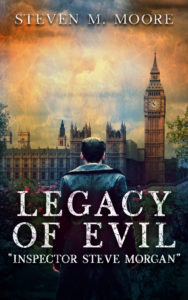Is traditional publishing for you?
There are so many options for self-publishing a book nowadays, going from 100% DIY to paid aggregators like Draft2Digital to Smashwords (I purposely omit Amazon—I avoid the Bezos bots as much as possible), that the question in the title hardly makes any sense anymore. To put it more bluntly: Why in the hell would any author bother with traditional publishing?
 I have to confess that I’ve succumbed to temptation myself and experimented with traditional publishing: Penmore Press published Rembrandt’s Angel and Son of Thunder, the first two books in the “Esther Brookstone Art Detective” series (they were followed by seven more, not from Penmore – see below for the latest); Black Opal Books published The Last Humans, the first book in “The Last Humans” series (the second was self-published). (I added Black Opal because Penmore didn’t publish sci-fi, and still doesn’t.) I could list many reasons that explain why I parted ways with these small presses. I won’t go into all of them in this article.
I have to confess that I’ve succumbed to temptation myself and experimented with traditional publishing: Penmore Press published Rembrandt’s Angel and Son of Thunder, the first two books in the “Esther Brookstone Art Detective” series (they were followed by seven more, not from Penmore – see below for the latest); Black Opal Books published The Last Humans, the first book in “The Last Humans” series (the second was self-published). (I added Black Opal because Penmore didn’t publish sci-fi, and still doesn’t.) I could list many reasons that explain why I parted ways with these small presses. I won’t go into all of them in this article.
 First, the positives for traditional publishing: If you want to try it, pick a publisher that doesn’t require that you have an agent. In other words, avoid agents. Period! Too many are pariahs who have the hubris to think they’re qualified to be gatekeepers for acquisition editors who want agents to keep slush piles small, which they do with a vengeance, making most traditionally published fiction formulaic, schlock, and a waste of time. Dealing with an acquistion editor directly is far better than dealing with an agent. Even if you can find a good and caring agent—an endangered species, to be sure—your agent will always stand between you and the acquisitions editor like a palace guard wielding an AR-15. Moreover, an acquisitions editor of a small press might also be an author who understands you.
First, the positives for traditional publishing: If you want to try it, pick a publisher that doesn’t require that you have an agent. In other words, avoid agents. Period! Too many are pariahs who have the hubris to think they’re qualified to be gatekeepers for acquisition editors who want agents to keep slush piles small, which they do with a vengeance, making most traditionally published fiction formulaic, schlock, and a waste of time. Dealing with an acquistion editor directly is far better than dealing with an agent. Even if you can find a good and caring agent—an endangered species, to be sure—your agent will always stand between you and the acquisitions editor like a palace guard wielding an AR-15. Moreover, an acquisitions editor of a small press might also be an author who understands you.
More importantly, small presses are a lot more efficient than those publishers that have been swallowed up by one of the Big Five’s publishing conglomerates, but lack of efficiency is my biggest complaint about all traditional publishing. After writing and editing a manuscript and purchasing an appropriate cover, my latest self-published novels are being distributed in a day! No traditional publisher can beat that! It took me several years to see those Penmore and Black Opal books published. I’m sure that any Big Five publisher is much worse. They only rush to press for worthless celeb and scandal books that appeal to the salacious interests of some readers. A good story, on the other hand, runs a long gauntlet of delaying steps, going from acceptance to published book when any traditional publisher is used. I know because I’ve experienced it!
Frankly, I tried Penmore and Black Opal because I wanted to experiment with traditional publishing. For both of them, I looked at their small list of published books and decided mine could find a nice home there among them. I’ve met some interesting authors by doing so, and the acquistion editors at first seemed enthusiastic about my prose. I regret none of that. No one should ever regret a learning experience.
But now I’m cured. I will stick with self-publishing in the future and try to forget about the pain of traditional publishing.
***
 Comments are always welcome. (Please follow the rules on the “Join the Conversation” web page.)
Comments are always welcome. (Please follow the rules on the “Join the Conversation” web page.)
Legacy of Evil. Due to today’s efficiency in self-publishing, my latest novel from Draft2Digital was published soon after Celtic Chronicles, Book Nine in the “Esther Brookstone Art Detective” series, but it’s more of a sequel to The Klimt Connection, Book Eight, where you first met the protagonist. Former Scotland Yard Inspector Steve Morgan receives his first murder case after a transfer to Bristol PD and a stressful secondment to MI5. An old man’s murder is soon followed by three related ones. Their investigations lead the DI and his team to probe the operations of a national crime syndicate as well as uncover a Russian oligarch’s plans to destabilize the UK. Eventually, both MI5 and NCA become involved. Available wherever quality ebooks are sold (just not on Amazon).
Around the world and to the stars! In libris libertas!
